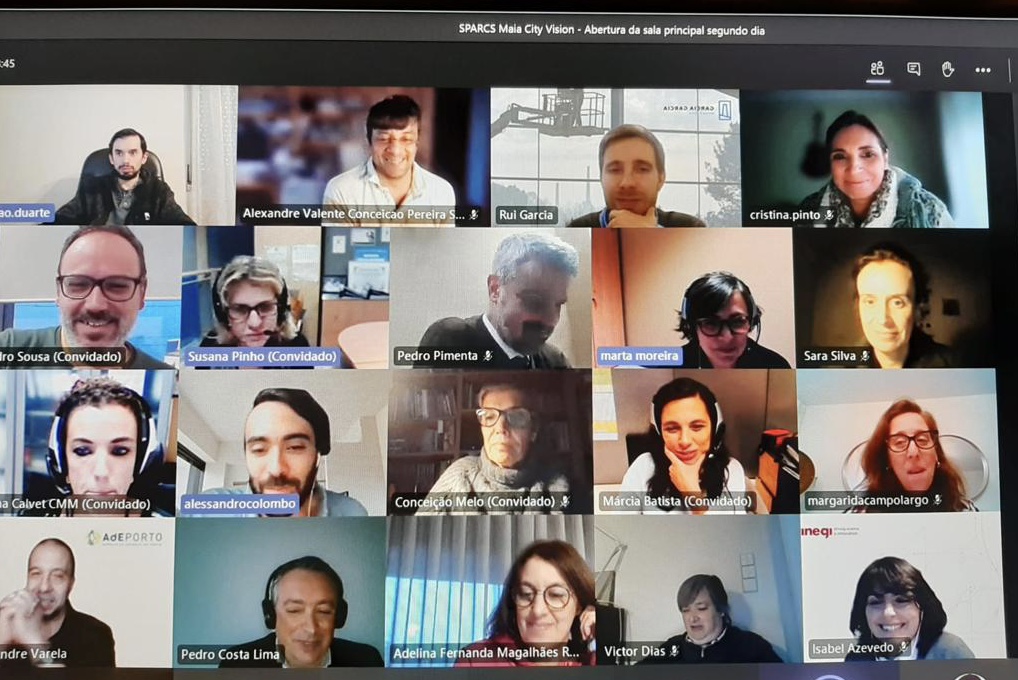Maia City Vision 2050
As part of the SPARCS City Vision 2050 project, a two-day workshop was held from Maia on the 24th and 25th of November in remote mode, with the aim of co-creating a desired vision of the city of Maia for 2050 among the community of citizens and other stakeholders. The workshop was organized by an internal multidisciplinary technical team, accompanied by the Portuguese SPARCS partners SPI – Portuguese Society of Innovation and NEW R&D, joined by INEGI – Institute of Science and Innovation in Engineering and AdEPorto – Porto Energy Agency. A group of experts was also invited to participate in the previously defined strategic work areas: Urban Development, Energy Transition, Mobility, Smart and Sustainable City and Integrated and Inclusive City. This event was fortunate to have a wide range of key local actors and citizens deeply committed to collaborating in achieving the goals for this SPARCS initiative.
The challenge of the workshop was to co-produce a City/Territory Vision, looking at how the urban city community engages and commits to the long-term strategic goals SPARCS sets out to achieve.
The opening session highlighted the importance of the City Vision as informed support for urban transformation towards energy transition in cities, aiming for energy positivity and carbon neutrality by 2050.
The event addressed the City Vision as a co-creation process between city managers, industries, SME’s, entrepreneurs, educational community and citizens.
Participants also had the opportunity to discuss the objective of the City Vision debate, concluding that to envisage and forecast the future of cities in detail, with the active participation of their stakeholders, and to harmoniously integrate their interests without risking the common goals of sustainability, the essential focus will always have to be on fostering a sharing mindset between all the partners.
In the broad debate that took place throughout the event, it was quite clear that all the participants agreed on the concept that the City Vision is an essential element for the definition of a roadmap towards the goal of urban transformation. By following this roadmap, the mapping and monitoring of concrete actions of the SPARCS project will be facilitated and more efficient.
The workshop was guided by a strong practical component where working groups were created by strategic areas, and the moderators launched several challenges to the participants’ ability to think prospectively and formulate problems, solutions and specific situations in simulated scenarios that may occur in the future. The challenges presented were rooted in the proposed issues that called on participants to reflect and elaborate on their participation in the city’s transformation process and its impacts on everyday life.
A real brainstorming climate was generated, with the group and each participant giving ideas and simulating how Maia would be represented, what the objectives were, and the enriching and positively heated debate exercise culminated in the generation of a variety of desirable visions about the future of energy positivity and zero carbon in 2050 in Maia.
Finally, a broad consensus was generated among all participants regarding the importance of the event for literacy regarding the various aspects that make up the urban transformation process, with relevance for the degree of perception of the actors involved in the SPARCS cooperation process, by promoting the collaborative sharing of experiences and facilitating a close and fruitful dialogue between all the people involved, which are the faces of the various partners involved in SPARCS.
The initiative has also made it possible to realize that local actors have to share their professional and technical commitment with multiple activities for which they are responsible in the entities they represent, highlighting the awareness that they will henceforth be called upon to make an increased effort in the pursuit of this public and personal mission, to which they have been called, and to which they are unequivocally committed.
In conclusion, we believe this initiative was successful and laid the foundations for a solid and fruitful collaboration between the city and all of its stakeholders.

